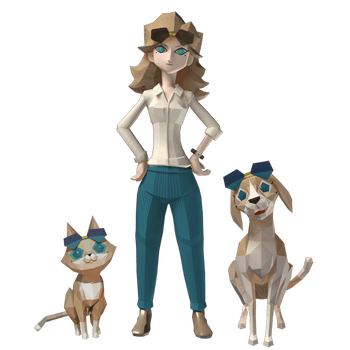The Tokyo Game Show is one of the biggest consumer-oriented events for video games worldwide. It has also traditionally been a big place for business, and all the major Japanese game announcements. But over the years, the show has evolved from one of announcements to one of catchups – these days, more games are announced at E3, or Gamescom, or even PAX.
At the same time, over the last year or so, the game press has declared that “Japan is back!” Hits, or at the very least interesting games like Persona 5, Final Fantasy XV, Yakuza Kiwami, Nier Automata, and others, have given players the feeling that Japan is back on its proverbial game.
But how do Japanese game developers themselves feel? And how does the Tokyo Game Show reflect these changes? We asked four venerable developers – Naoto Ohshima (Sonic the Hedgehog), Hidetaka "Swery" Suehiro (Deadly Premonition), Kotori Yoshimura (Star Cruiser), and Tak Fujii (Ninety Nine Nights) to give us their thoughts.
Naoto Ohshima
Naoto Ohshima has been making games for decades. He’s best known as the character designer and artist for Sonic the Hedgehog (and director of Sonic CD), but he’s also worked on dozens of other series throughout the years, such as Blinx, Blue Dragon, and most recently, Hey! Pikmin, under his new company Arzest. He has attended TGS many times throughout his career, so makes the perfect interview subject.
How did you feel about this year’s TGS in general? How would you compare it to the 90s, when you were exhibiting Sonic?
"I feel there’s nothing new and challenging being made in Japan. I got the feeling that only games with strong existing IP and characters were being shown."
Ohshima: I feel there’s nothing new and challenging being made in Japan. I got the feeling that only games with strong existing IP and characters were being shown.
Back in the 90s we were always tackling new challenges, breaking ground with new technology, which you can see in early 3D games like Virtua Fighter. We were bringing a more cinematic experience to games, and and tackling the challenges that came with that.
I am hoping Mr. Shigeru Miyamoto will revive and bring us something new. I think we still need new games and new ideas in order for the industry to survive.
How do you feel this year’s TGS reflected the current state of the Japanese game industry?
Ohshima: Japan has become a place where the smartphone is the main platform. So if you want to make something new, that might be the best platform to tackle.
On the other hand, since smartphone games basically have to be free, players will leave if they aren’t having immediate fun 5 minutes after they start playing. This means it’s very difficult to make a new challenging game on the smartphone platform.
And how do you feel about the future of the Japanese game industry then?
Ohshima: The business of making new games in Japan is going under water. We have to challenge ourselves to fight against this tide.
 Arzest recently developed Hey! Pikmin for Nintendo
Arzest recently developed Hey! Pikmin for Nintendo
Hidetaka "Swery" Suehiro
Swery, Buddhist monk and developer of Deadly Premonition, D4, who has also worked on games like The Last Blade and Drakengard 3, came to TGS without a game this year. He’s currently crowdfunding a game on Fig (The Good Life) that’s in its final days. As he ran around doing interviews, he gave us his thoughts.
How did you feel about this year's TGS versus recent years' TGS?
"There were even bigger booths and wider aisles compared to last year. It gave me the feeling there might be fewer exhibitors than last year."
Suehiro: This year's TGS has even bigger booths and wider aisles compared to last year. It gave me the feeling there might be fewer exhibitors than last year.
Also, I felt that there were more visitors from Asia than last year. Especially the creators from Taiwan, China, Hong Kong were seen to be moving in a small group.
If I focus on the Indie booth… It might be bigger than last year. A lot of visitors were playing their indie games and talking about publishing or something. But that was only during the business days [the first two days of the conference]. Regular Japanese users were not as interested in them as I thought.
How do you feel TGS reflects the current state of the japanese game industry?
Suehiro: Aging, and declining birthrate. And also it might became more like the Galapagos.
What do you feel is your place at TGS as a newly independent developer?
 Suehiro: I couldn't show anything for this year. Because we started only 6 months ago. I could only talk about my FIG campaign The Good Life [right]. I had 5 or 6 interviews during TGS and I shot some video program for French media. I hope that I can show something to you guys at the next TGS.
Suehiro: I couldn't show anything for this year. Because we started only 6 months ago. I could only talk about my FIG campaign The Good Life [right]. I had 5 or 6 interviews during TGS and I shot some video program for French media. I hope that I can show something to you guys at the next TGS.
And just to my fans -- at the time of writing this, the FIG campaign may not be doing very well. But... please don't quit helping us. Please continue with support.
No tags.



































